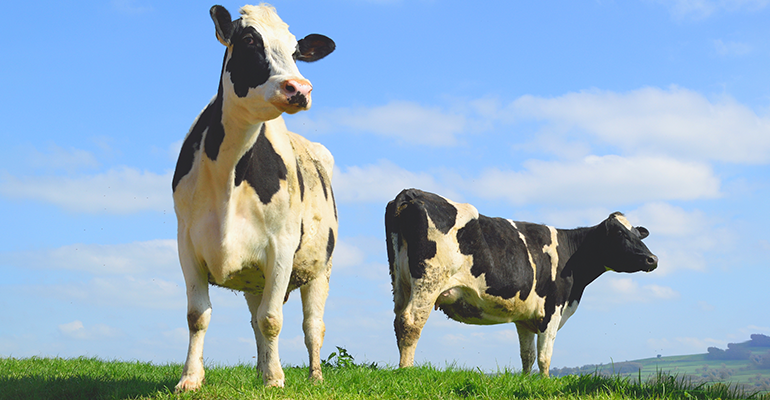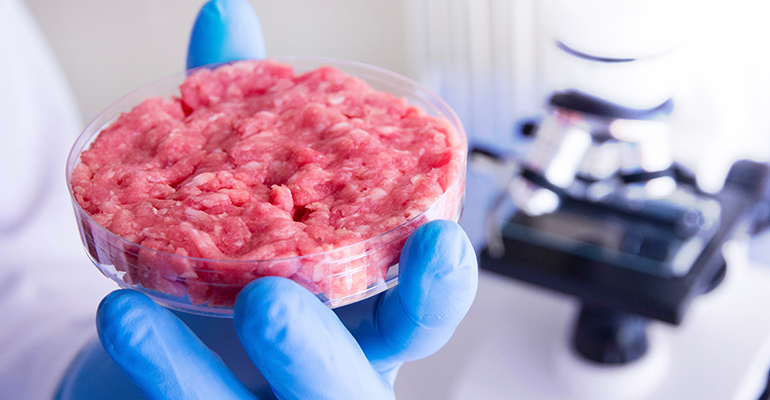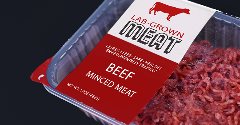News
The UK could become world’s next sustainable protein powerhouse, new research suggests
5 Sep 2023The UK is well-placed to become a world leader in sustainable protein production, yet regulators must act quickly and invest considerably to risk losing out, the findings of a new Good Food Institute (GFI) report suggest.
Producing and scaling up sustainable proteins such as cultivated and plant-based meat presents a huge growth opportunity for the UK food industry, the findings of a new report by international non-profit GFI Europe show. Outlining a transformative vision for the domestic plant-based sector, the report urges UK policymakers to invest a total of £390 million (€456 million) in plant-based and cultivated meat technologies by 2030.

Collaboration between entrepreneurs, regulators, scientists, and food manufacturers around sustainable proteins can unlock wide-reaching financial and environmental benefits for the country, the report suggests.
This opportunity is particularly significant given the mounting sustainability and geopolitical challenges faced by the animal-based protein market. However, action must be taken quickly to avoid losing out to competing countries, the report says.
UK seeks to fulfil the demand for sustainable proteins
The UK has a critical role to play in shaping how protein is produced, conceptualised, and consumed, according to the GFI. The call-to-action comes as the sustainability, accessibility, and affordability of conventional animal protein is of increasing concern to consumers and industry alike.
The rising demand for animal-based protein is highly unsustainable. Animal agriculture currently accounts for 60% of the planet’s ice-free land and almost 15% of all global greenhouse gas emissions, data from the Food and Agriculture Organization (FAO) shows. At the same time, a staggering 65% of consumers worldwide are actively looking to increase their protein intake in the years ahead, according to FMCG Gurus.
To address this rising demand, the cultivated meat sector in the UK has grown significantly in recent years. Last year, the 23 British companies that are active in the sector attracted more investment than the rest of Europe combined.
“The UK is home to dynamic food producers, world-leading scientists and a strong plant-based market – all the tools needed to build a globally competitive sustainable protein industry capable of reducing emissions, creating green jobs and making the country less reliant on imports,” Linus Pardoe, UK policy manager at GFI Europe said.
Unlocking economic and environmental gains
The GFI report follows analysis recently published by London-based think tank Green Alliance, revealing that by 2035 the sustainable protein industry in the UK could create a quarter of a million jobs and reach a value of £6.8 billion (€7.95 billion).
Investing £78 million (€91 million) annually from 2025 to 2030 in research in foods such as plant-based and cultivated-meat could help the British government to create sustainable jobs and boost domestic food security, the research suggests. This call-to-action aligns with the UK’s mission to become a science superpower by 2030.
Beyond economic gains, developing the UK’s sustainable protein sector could also offer significant environmental benefits, the findings show. According to one study, replacing conventional meat with plant-based alternatives has the potential to reduce climate emissions by up to 92%. Investing in plant-based technologies could support the food and beverage industry in reaching global climate targets and mitigating carbon emissions.
 © AdobeStock/xyz+
© AdobeStock/xyz+
Investment in cultivated meat leapfrogs plant-based alternatives
The past decade saw the UK’s main research funding agency UK Research and Innovation invest around £43 million in R&D targeting the plant-based, fermentation and cultivated meat, seafood, eggs, and dairy sectors. Most of this (65%) was allocated since the start of 2022.
Yet, current public funding in the alternative protein sector disproportionately favours cultivated meat research, while plant-based alternatives and precision fermentation have been neglected, the report says. Despite being Europe’s second largest market for plant-based products, the UK allocated £15 (€17.5 million) million to plant-based R&D in the past decade, compared to £17.2 million (€20 million) in cultivated meat in 2022 alone.
While the cultivated meat sector has made significant strides, the report reveals that on a global stage, precision fermentation remains underdeveloped in the UK, despite its potential for creating sustainable proteins, economic growth, and employment opportunities.
Act fast or risk losing out, GFI says
As well as committing £390 million to sustainable proteins by 2030, the report recommends that the government provide £30 million (€35 million) in funding to the Food Standards Agency (FSA) at the presentation of the 2023 mid-annual budget statement.
According to the GFI, the funding will help to build confidence in the sector and alleviate regulatory challenges, enabling the FSA to fulfil its additional post-Brexit responsibilities.
Failing to deliver on these recommendations could open the UK up to increased competition from countries with well-established plant-based protein ecosystems and could encourage startups to move overseas to avoid regulatory challenges, the report suggests.
“The government promised to keep the UK at the forefront of this growing sector in last year’s food strategy, but it must act now to deliver on that ambition, including investing £390 million in research and giving the Food Standards Agency the resources it urgently needs. Failing to act risks the UK missing out on economic and environmental benefits as other countries race ahead,” Pardoe said.
Related news

Israel approves Aleph Farms’ cell-cultured beef in world first
1 Feb 2024
Israel has granted the first regulatory approval for the commercial sale of cultivated beef, joining the US and Singapore in officially recognising cultivated meat’s role towards protein diversification.
Read more
Fazer and Solar Foods launch snack bar made with air protein
30 Jan 2024
Finnish food manufacturer Fazer has teamed up with foodtech startup Solar Foods to launch a limited-edition snack bar in Singapore made using a novel, carbon-fed microbial protein.
Read more
Big brands invest in precision fermentation-derived palm oil
25 Jan 2024
Although still not approved for food applications, big brands such as Unilever and Doehler are investing in precision fermentation-derived palm oil in a bid to reduce the environmental impact associated with this conventional palm oil.
Read more
Supergrain fonio expands its reach in US market
11 Jan 2024
More US consumers will find nutritious, climate-smart grain fonio in supermarkets thanks to a new distribution structure for the import’s most prominent commercial brand, Yolélé.
Read more
Sustainability meets innovation at Fi Europe 2023's Sustainability Ingredients Zone
9 Jan 2024
Fi Europe’s Sustainable Ingredients Zone showcases ingredients forging a path toward a greener future. Three innovators are redefining what sustainability within the food and beverage industry means, with upcycled products, regenerative agriculture, an...
Read more
Supermarkets innovate with private label plant-based ranges
9 Jan 2024
Plant-based product ranges are an important part of retailers’ private label innovation efforts – and represent an important way for supermarkets to reduce their environmental impact.
Read more
The UK prepares to open food security science centre
2 Jan 2024
Amid global food insecurity, the UK government says it is committed to producing crops resilient to climate change and addressing hunger and malnutrition with a food security science centre.
Read more
Novel food safety platform could eliminate animal testing
21 Dec 2023
The European Food Safety Authority (EFSA) has introduced a new platform that has the potential to eliminate animal testing in the food industry.
Read more
Water-conscious consumers, upcycled food, and tech-driven sustainability: Highlights from Fi Europe, part 2
14 Dec 2023
With climate change becoming a tangible reality, consumers’ environmental concerns are changing. At Fi Europe, market analysts revealed how people are now interested in everyday issues like water shortages and tech-driven solutions such as GM drought-r...
Read more
The food industry’s single-use packaging problem
12 Dec 2023
The food industry’s reliance on single-use packaging is a sustainability “sticking point” with viable alternatives not widely available – but new EU rules mean food businesses will remain responsible for the collection and disposal of the packaging the...
Read more